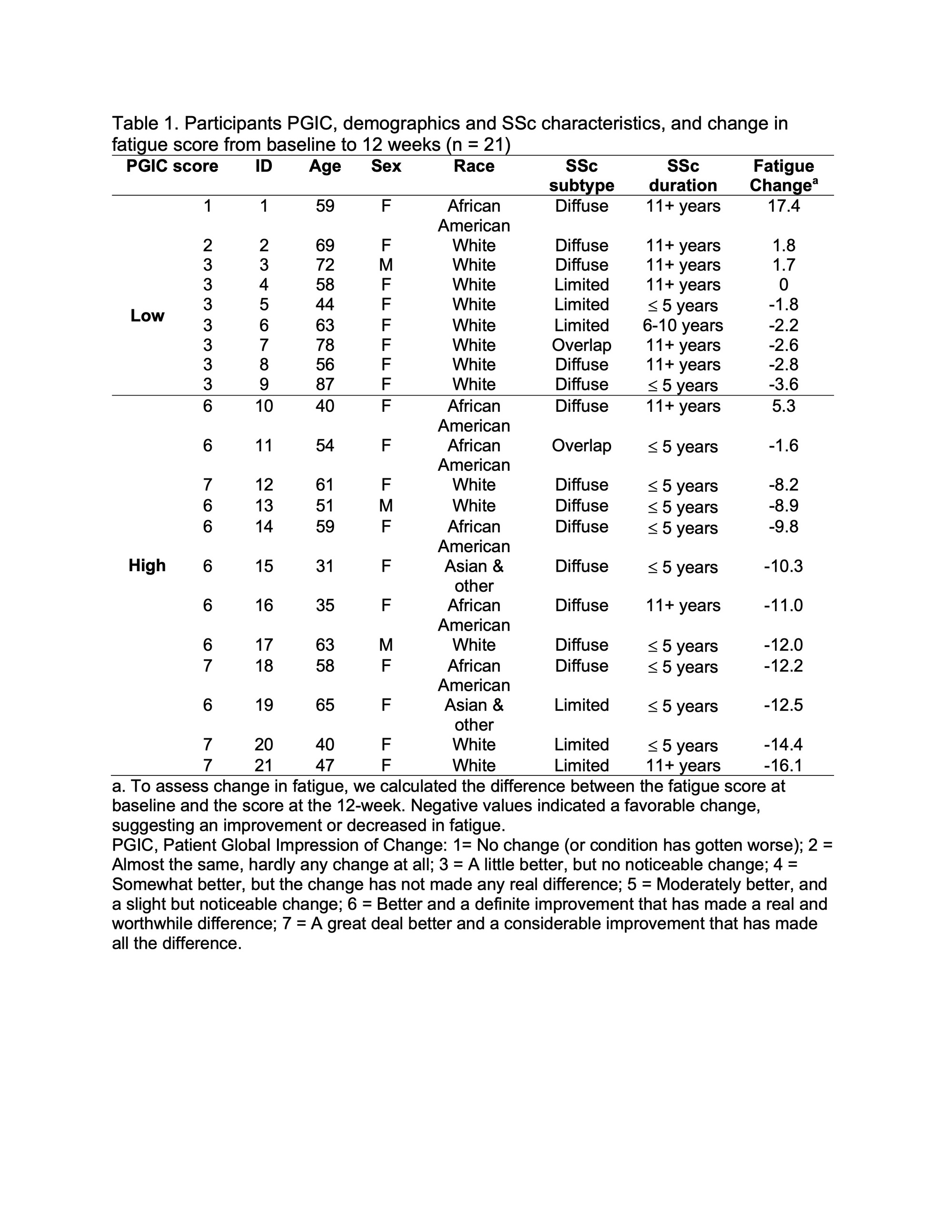Session Information
Date: Monday, November 13, 2023
Title: (1256–1263) Psychology/Social Science – Interprofessional Poster
Session Type: Poster Session B
Session Time: 9:00AM-11:00AM
Background/Purpose: People with systemic sclerosis (SSc) often experience fatigue, which impacts daily life functioning and quality of life. We developed a 12-week, resilience-based energy management intervention to promote well-being (RENEW) that focuses on healthy behaviors and resilience skills. Participants worked with a trained peer health coach, who also has SSc, setting healthy goals and tracking progress. We conducted interviews to explore participant experience and the impact of RENEW on SSc symptom management.
Methods: From a clinical trial (ClinicalTrials.gov: NCT04908943) testing the effectiveness of the RENEW program versus a waitlist control, we purposively selected RENEW program participants who scored high or low on the Patient Global Impression of Change (PGIC) scale. We then conducted virtual interviews (N = 21). Transcripts were analyzed using the rigorous and accelerated data reduction (RADaR) technique combined with thematic content analysis. During the coding process, codes were refined collaboratively by coders, including a patient partner. Any discrepancies were resolved through discussions. Codes with similar content were merged and organized into subthemes and themes to better understand the data.
Results: Twenty-one participants (mean age = 57 ± 14 years; 18 females; 13 diffuse SSc subtype; 11 early disease duration ≤ 5 years) with 12 reported high PGIC (Table 1). Five themes were identified (Figure 1). 1) Peer health coaches: Participants valued support provided by peer health coaches. The coaches understood their needs and provided guidance throughout the program, helping them set achievable goals and develop strategies to overcome challenges. 2) Impact of participation: RENEW had a positive impact on managing fatigue. Participants reported gaining knowledge and skills in developing healthy behaviors that improved their overall physical and mental health. 3) Program experiences: Participants expressed overall satisfaction with comprehensiveness and relevance to SSc. However, they faced difficulties in managing everyday life stressors and obligations, which sometimes affected their motivation and/or ability to participate in RENEW. 4) Need for a tailored approach: Although results were generally positive, participants suggested tailoring the approach to optimize effectiveness of RENEW. They recommended tailored information for newly diagnosed patients versus those with a longer disease duration to better address specific needs. 5) Role of technology: Participants appreciated the convenience of Zoom and easy accessibility of the program through an online platform or app. However, some participants mentioned that the app was not user-friendly and suggested improvement.
Conclusion: Our findings highlighted the importance of the peer health coach component to our self-management intervention. Participation in the program led to improved fatigue management and well-being for individuals with SSc. However, we identified a need to tailor RENEW based on different SSc duration groups. While the virtual program was convenient, suggestions for improving the app were noted. These findings contribute to the development and refinement of future interventions for people with SSc.
To cite this abstract in AMA style:
Chen Y, Harper A, Phanhdone T, Alore M, Hicks S, Pape A, Jay G, Bolde S, Feldpausch J, Khanna D, Murphy S. “Somebody Who’s Been There and Can Understand the Challenges That You’re Going Through”: Participant Perspectives of a Resilience-Based Energy Management Online Intervention for Systemic Sclerosis with Peer Health Coaches [abstract]. Arthritis Rheumatol. 2023; 75 (suppl 9). https://acrabstracts.org/abstract/somebody-whos-been-there-and-can-understand-the-challenges-that-youre-going-through-participant-perspectives-of-a-resilience-based-energy-management-online-interve/. Accessed .« Back to ACR Convergence 2023
ACR Meeting Abstracts - https://acrabstracts.org/abstract/somebody-whos-been-there-and-can-understand-the-challenges-that-youre-going-through-participant-perspectives-of-a-resilience-based-energy-management-online-interve/


